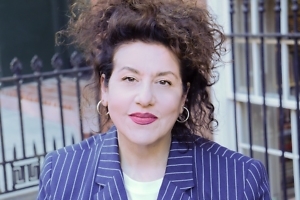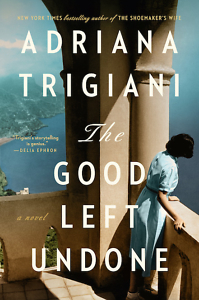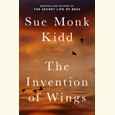The Mission of the Family
Love rules in Adriana Trigiani’s The Good Left Undone
At age 52, Adriana Trigiani reigns as one of the most prolific and prodigious queens of women’s fiction. She’s published a novel or work of nonfiction almost every year since 2000. This is not to mention her dramatic writing for stage and screen, or her recent children’s picture book. Her work teems with plotlines, dialogue, and character-driven tales rich in love, ripe with familial drama, and leavened by humor. The driving force of her new novel, The Good Left Undone, narrated in omniscient third person, can be summed up in this single sentence, averred by the book’s protagonist, Matelda Cabrelli Roffo: “A family is only as strong as their stories.”

The novel has two retrospective frames. The book begins with Matelda at age 81, nearing the end of her life in the Tuscan seaside village where she’s lived for as long as she can recall. “You didn’t need a clock in Viareggio; you lived by the bells and the baker.” Ready to join her mother, Domenica, in heaven, Matelda must first pay homage to her matrilineal relatives by sharing Domenica’s untold history with her own 20-something granddaughter, Anina. “When a housewife grows old, her final task is to imagine what will endure of her life’s work after she is gone. The mother shapes the mission of the family, and if she fails, the family fails with her.” Therein, dear reader, lies the good left to be done.
The present and past are interspliced throughout the book, the former owned by Matelda and the latter by Domenica. As her health falters, Matelda tries to remember and reckon with her roots. By turns, as Anina learns about her grandmother Domenica’s epic marriages (yes, plural) for the first time, she’s inspired to make seismic changes in her own relationship and career.
 The other half of the book unfolds in Italy, Southern France, and the U.K. over a 26-year span beginning in 1920. It covers Domenica’s adolescence through her late 30s, stages in which her fortitude and willfulness are always on full display. She falls in love and lives through World War II, during which she suffers the loss of her first husband, as well as her only brother. This is not an era of irony, but one of Manichean struggle that polarizes characters shot through with notions of virtue and evil on opposite sides. All of the Germans in this novel, including Nazis as well as prisoners of war, are vile, ranging from murderous to criminally myopic. Almost every Italian, on the other hand, is depicted as thoroughly meritorious.
The other half of the book unfolds in Italy, Southern France, and the U.K. over a 26-year span beginning in 1920. It covers Domenica’s adolescence through her late 30s, stages in which her fortitude and willfulness are always on full display. She falls in love and lives through World War II, during which she suffers the loss of her first husband, as well as her only brother. This is not an era of irony, but one of Manichean struggle that polarizes characters shot through with notions of virtue and evil on opposite sides. All of the Germans in this novel, including Nazis as well as prisoners of war, are vile, ranging from murderous to criminally myopic. Almost every Italian, on the other hand, is depicted as thoroughly meritorious.
After the war, free from the threat of impending doom, characters are allowed to be both good and bad at the same time. While Domenica, from start to finish, is driven by righteousness, charity, fierce loyalty, practicality, and Catholic faith, her daughter, Matelda, blessedly, appreciates sarcasm. “My humor is so dry,” she quips, “it’s made of bread crumbs.”
At the heart of every Trigiani work, love rules. There is sure to be romance and, relatedly, there will be obstacles. The ultimate path, hopefully, leads women to self-actualization, as articulated in this advice from Matelda to Anina: “Love yourself. That’s the great adventure. It’s a love affair that lasts your whole life long. When you love yourself, you want to fulfill your purpose. To make things. To create. And if a man comes along, and believe me, he will, the relationship is already off to a good start because both of you love the same person. You. Lucky him.”
Fans of Trigiani are in for a feast, sure to close this book fully satisfied by its striking images, quotable lines, and feelings.

Sarah Norris has written about books and culture for The New Yorker, The San Francisco Chronicle, The Village Voice, and others. After 15 years in New York, she lives in Nashville, where she was born.


